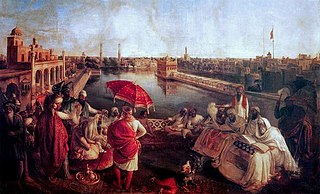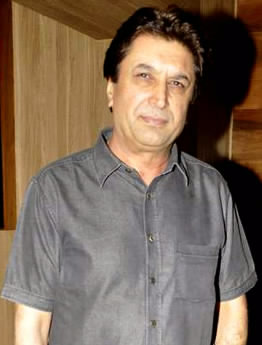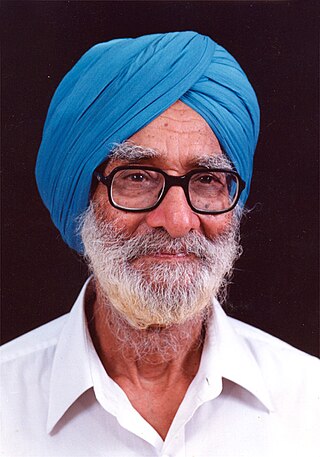
Sikhs are an ethnoreligious group who adhere to Sikhism, a religion that originated in the late 15th century in the Punjab region of the Indian subcontinent, based on the revelation of Guru Nanak. The term Sikh has its origin in the Sanskrit word śiṣya, meaning 'seeker', 'disciple' or 'student'.

Malerkotla is a city and the district headquarters of Malerkotla district in the Indian state of Punjab. It served as the seat of the eponymous princely state during the British Raj. The state acceded to the union of India in 1947 and was merged with other nearby princely states to form the Patiala and East Punjab States Union (PEPSU).

Guru Nanak Gurpurab, also known as Guru Nanak Prakash Utsav, celebrates the birth of the first Sikh guru, Guru Nanak. One of the most celebrated and important Sikh gurus and the founder of Sikhism, Guru Nanak is highly revered by the Sikh community. This is one of the most sacred festivals in Sikhism, or Sikhi. The festivities in the Sikh religion revolve around the anniversaries of the 10 Sikh Gurus. These Gurus were responsible for shaping the beliefs of the Sikhs. Their birthdays, known as Gurpurab, are occasions for celebration and prayer among the Sikhs.

Sardar Sir Jogendra Singh KCSI was a member of the Viceroy's Executive Council in India. He served as Chairman of the Department of Health, Education and Lands. He was a figure in the Sikh community and one of several delegates chosen to represent the Sikh community before the Cripps' mission of 1942. He is also considered responsible for setting up a committee in 1946 that led to the formation of Indian Institutes of Technology.
Guru Nanak founded the Sikh religion in the Punjab region of the northern part of the Indian subcontinent in the 15th century and opposed many traditional practices like fasting, Upanayana, idolatry, caste system, ascetism, azan, economic materialism, and gender discrimination.

Sobha Singh was an artist from Punjab, India.

Ravidassia or the Ravidas Panth is a religion based on the teachings of Guru Ravidas. It was considered a sect within Sikhism until 2009. However, some Ravidassias continue to maintain Sikh religious practices, including the reverence of the Guru Granth Sahib as their focal religious text, wearing Sikh articles of faith (5Ks), and appending Singh or Kaur to their names.

Surinder Kaur was an Indian singer and songwriter. While she mainly sang Punjabi folk songs, where she is credited for pioneering and popularising the genre, Kaur also recorded songs as a playback singer for Hindi films between 1948 and 1952. For her contributions to Punjabi music, she earned the sobriquet Nightingale of Punjab, the Sangeet Natak Akademi Award in 1984, and the Padma Shri in 2006.

Mangal Singh Dhillon was an Indian actor, writer, director and film producer. He was born in Wander Jatana near Kotkapura in Faridkot district, Punjab.

Harjinder Singh Dilgeer is a Sikh historian and author.

Gurū Nānak, also known as Bābā Nānak, was an Indian spiritual teacher, mystic and poet, who is regarded as the founder of Sikhism and is the first of the ten Sikh Gurus.

The Panjab Digital Library is a voluntary organization digitizing and preserving the cultural heritage of Panjab since 2003. With over 65 million digitized pages, it is the biggest resource of digital material on Panjab. There are many historically significant documents stored and made available online. Its scope covers Sikh and Punjabi culture. The library funded by The Nanakshahi Trust was launched online in August 2009. Its base office is located at Chandigarh, India.
Roopinder Singh is an Indian journalist and author. He retired as Senior Associate Editor with the English daily newspaper, The Tribune, published from Chandigarh, India. in 2020. His specialization is Sikh history and culture, information technology, and education. He is the author of six major books in English, including a critically acclaimed volume on the founder of Sikh religion, Guru Nanak Dev, and a volume on Sikh heritage. He lives in Chandigarh, Punjab.

Navnindra Behl is an Indian theatre and television director, writer and actor.

The State of Malerkotla or Maler Kotla was a princely state in the Punjab region during the era of British India. The last Nawab of Maler Kotla signed the instrument of accession to join the Dominion of India on 20 August 1948. Its rulers belonged to a Sarwani and Lodi Pashtun dynasty from Afghanistan, and its capital was in Malerkotla. The state belonged to the Punjab States Agency.

The Shiromani Akali Dal (SAD) is a centre-right Sikh-centric state political party in Punjab, India. The party is the second-oldest in India, after Congress, being founded in 1920. Although there are many parties with the description Akali Dal, the party that is recognized as "Shiromani Akali Dal" by the Election Commission of India is the one led by Sukhbir Singh Badal. The party has a moderate Punjabi agenda. On 26 September 2020, it left the National Democratic Alliance over the farm bills.

Jagtar Singh Grewal was an Indian writer, historian, scholar, and a vice-chancellor of the Guru Nanak Dev University (GNDU).

Dr. Harcharan Singh (1914–2006) was an Indian dramatist and writer in the Punjabi language. He dedicated 69 years of his life to Punjabi theater, in which he authored 51 books and staged numerous plays all over the world.

The Jathedar of the Akal Takht is the head of the Akal Takht and head of the Sikhs worldwide. The jathedar has the de facto power as the supreme spokesperson of the Khalsa to summon, trial and sentence any person who identifies as a Sikh from the Akal Takht.
Huma Safdar is a teacher, theatre artist, Punjabi language activist and director of feminist theatre “Sangat”. As an artist, she worked with Punjab Lok Rahs. She has taught as art and Punjabi language teacher in Lahore Grammar School. She has contributed a lot to promote Punjabi theatre, literature and folklore.

















